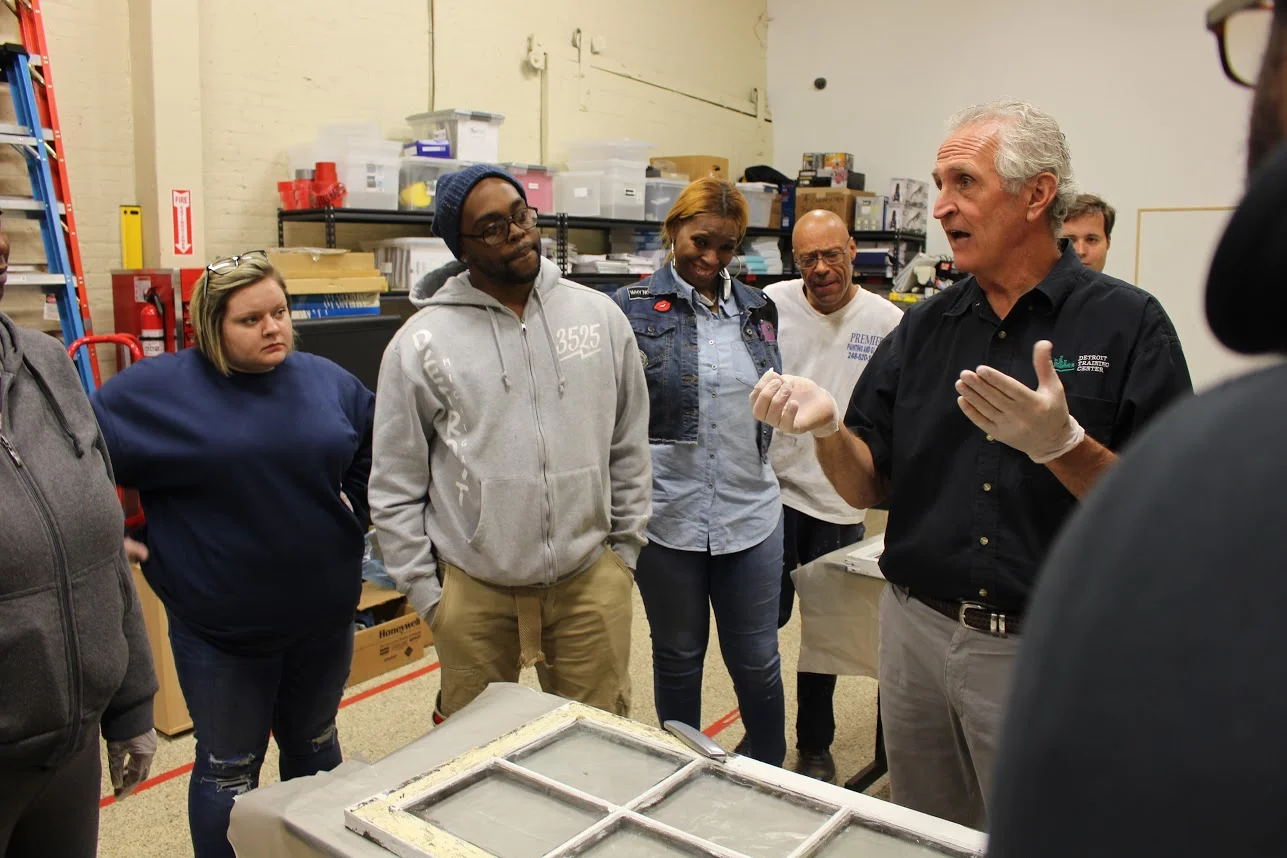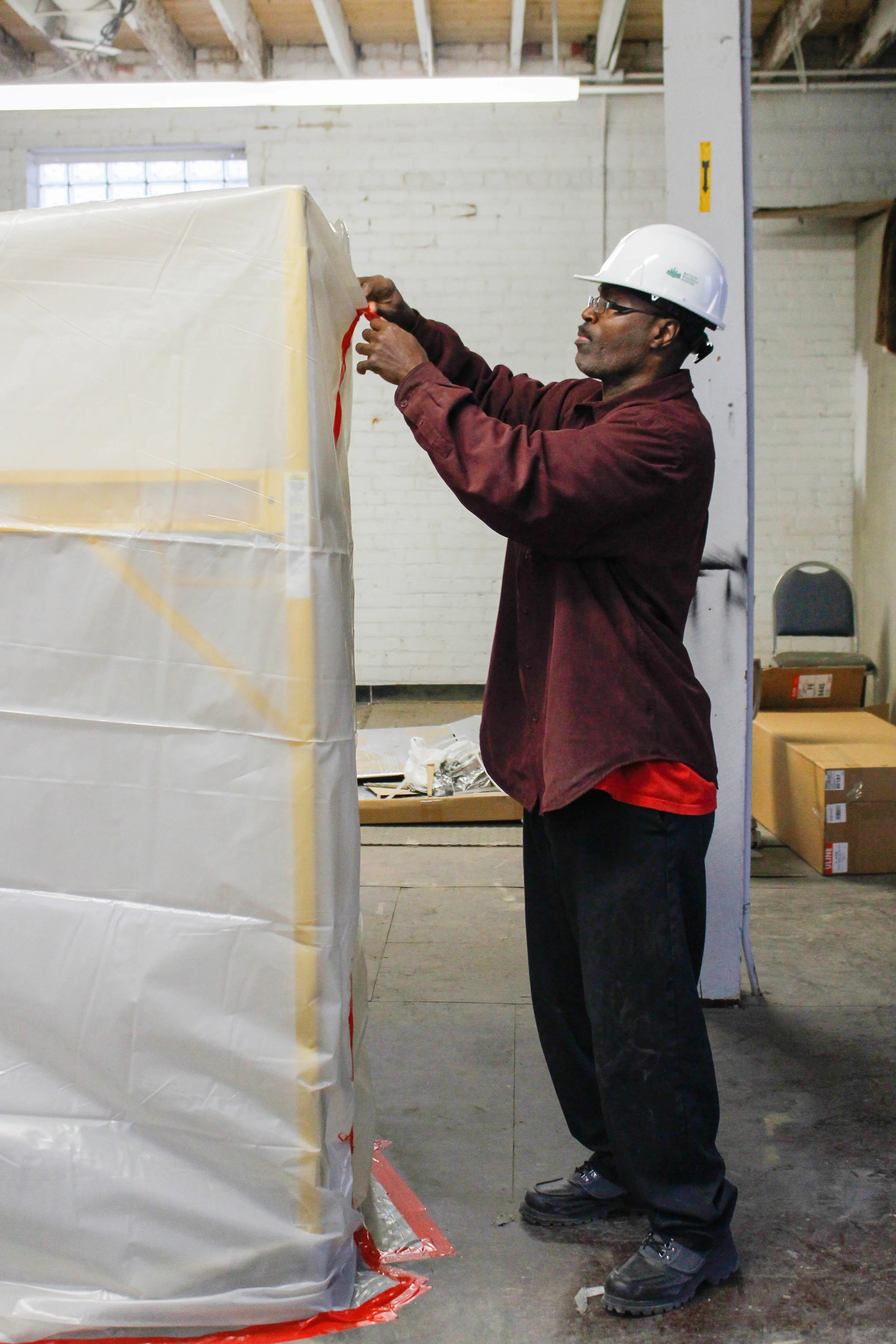Picture shows Lead Paint Testing Instruction shot by Chris Davis
lead abatement noun. process of safely reducing lead hazards in a home, commercial or industrial setting.
lead abatement supervisor/worker
initial course
The Michigan Lead Abatement Act of 1998 requires certification of individuals engaged in lead-based paint activities in the state of Michigan. Certification requires the individual to meet minimum education and/or experience qualifications, successfully complete an accredited training course, and pass a third-party certification examination. Upon successful completion of the exam, a State of Michigan lead certification card will be issued to you. An individual is eligible to take the certification exam no more than three times within six months after receiving a course completion certificate. Certification is valid for three years with an annual maintenance fee. To be certified, you must take an approved training course, submit a Lead Professional Certification Application, and pass the State certification/third-party exam (usually scheduled twice each month). Once students have completed the application and paid all fees, the exam notice will be mailed to the individual.
Worker
Cost
$500 for Workers
Program Hours
24 Class Hours for Workers
8 am - 4 pm
UPCOMING DATES
Worker
March 25th - 27th, 2026
April 6th - 8th, 2026
8 am - 4 pm
Supervisor
Cost
$550 for Supervisors
schedule
32 Hours for Supervisors
8 am - 4 pm
UPCOMING DATES
supervisor
October 21st - October 24th, 2025
additional external fees
License and Testing Fee to the State of Michigan:
Fees depend on the month, and includes the application, certification and examination.
Workers: $115 - $125
Supervisor: $125 - $150
refresher course
Lead Abatement Certification is valid for three years--with an annual maintenance fee. Prior to the end of each three year period, a certification in good standing may be renewed by successful completion of an appropriate refresher course and third party exam. Upon successful completion of the exam, a State of Michigan lead certification card will be issued to you. An individual is eligible to take the certification exam no more than three times within six months after receiving a course completion certificate. The refresher training provides information on lead-based paint abatement and regulatory guidelines. It meets the EPA's training requirements for those individuals that will plan and/or oversee lead abatement work. A certified supervisor can perform all of the duties that a worker can. In addition, a supervisor is responsible for occupant safety during the abatement process and for writing the abatement plan. This course focuses on essential abatement procedures including site preparation, contract planning, project management, abatement implementation and record-keeping. Supervisor certifications are valid for three years. An annual certification fee is required by March 31st of each year to keep up-to-date, but no additional training or testing is needed. The Lead Professional Certification Refresher Application is available online to view and download.
Cost
$150 for Supervisors
schedule
8 Hours for Supervisors
additional external fees
License and Testing Fee to the State of Michigan:
$25 for Workers
$50 for Supervisors
upcoming refresher courses
Lead Supervisor Refresher
Tuesday, March 24th 2026, 8am - 4pm
*Equal Opportunity Program*
*Auxiliary aids and services are available upon request to individuals with disabilities*
If needed: Refunds will be given minus processing fees charged by Stripe.
lead abatement supervisor / worker
Lead Abatement Versus Lead RRP
Abatement and RRP activities may sometimes look similar, but they are not!
Abatement is a specialized activity designed to address lead in the home. RRP activities (including most home contracting work) disturb paint as a consequence of the activity, but they are often undertaken for reasons unrelated to lead issues.
Lead-Based Paint Activities (Abatement)
Lead-Based Paint Activities include lead-based paint inspections, risk assessments and abatements (lead-based paint removal).
Lead abatement projects are designed to permanently eliminate existing lead-based paint hazards. They may be ordered by a state or local government in response to a lead-poisoned child or other reason, or may be undertaken voluntarily at any time.
Lead risk assessments are designed to identify lead hazards and management strategies, and lead inspections are designed to locate all lead-based paint in a home.
Individuals must be trained and certified to conduct lead-based paint activities, and firms must be certified.
Lead-based activities are regulated differently than renovation, repair and painting jobs, even though, in some cases, the activities are similar.
Learn more about EPA's Lead-Based Paint Activities program.
Renovation, Repair and Painting (RRP)
RRP projects are typically performed at the option of the property owner for aesthetic or other reasons, or as an interim control to minimize lead hazards. It is NOT designed to permanently eliminate lead-based paint hazards.
Since RRP projects can disturb lead-based paint in homes and buildings built before 1978, thus creating new lead hazards, individual renovators must be trained and certified lead-safe RRP practices, and firms must be certified.
Learn more about EPA's RRP certification and training program .





